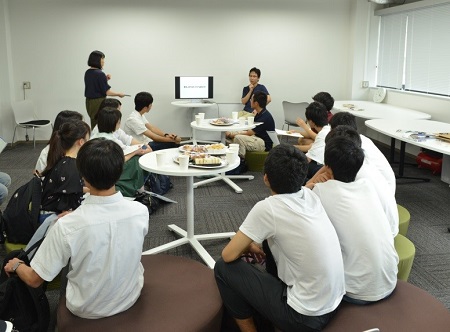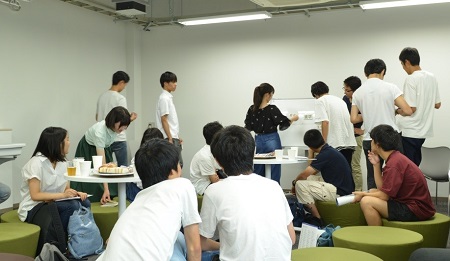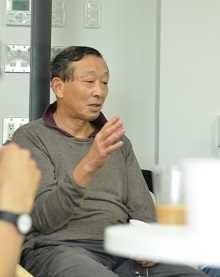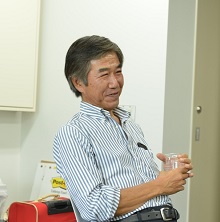Creative Cafe vol.10
2018.01.19
Creative Café series
Theme: Your view on science students - Creating a benchmark on the humanities vs sciences
Date/Time: Thursday, August 10, 2017 12:00 - 14:00
Place:South 5 407A (workshop room)
Participants: 20
Creative Cafe was held on August 10 on the occasion of Tokyo Tech Open campus.
Yuki Amisaki of Nohara Lab facilitated the discussion. Participants included high school students, prospective students, and Tokyo Tech graduates. While seeing concrete examples and data on slides, they had a lively discussion and shared their opinion on how they view "the humanities vs sciences".

(excerpt)
Image of science major
Amiasaki: Where do you think the typical image of a science-oriented person is derived from? Generally, a science major student conjures up the image of being serious and square. On the other hand, a humanity major is viewed as being able to handle literature and letters and being sensitive and creative. Can you share your image of science major students?
Prospective student: Appearance: a bit sloppy appearance with glasses
Way of thinking: logical thinking
Tokyo Tech graduate: Level of spontaneity is different. I think science students are not that spontaneous. Although doctors are also science majors, they are different.
Amisaki: Science majors are described in various ways. Let's take for example a book entitled "Cooking for Science Majors". Is the way they are described in this book consistent with real science majors?
Nohara: When I had lunch at Tokyo Tech cafeteria before, I was surprised to overhear an engineering major saying " ... g of rice, please" while ordering. I wondered if the student could grasp amount only by quantifying.
Wada: As an undergraduate student, once I was studying with a friend, a math major, for a test. We were talking using special mathematical jargon. I remember her saying at the time "I bet we look quite weird for others, don't you think so?". Jargon exists in every field, so what is the distinction between humanity majors and science majors, I wondered.
(On jargon)
Prospective student: I think that your impression or jargon depends on where you first encounter it. For example, the term "parabola" is not only used in mathematics, but many people hear the term in math class for the first time, resulting in associating it with science.
Amisaki: On the other hand, what constitutes "humanityish" ?
Nohara: Explaining things with association is a characteristic of a humanity major . For instance, saying something like "Trajectory of Midori Ito's jump is a beautiful parabola".
Lee: The way I see it, science majors tend to seek clear answers and conclusions, but humanity majors tend to not have clear conclusions. They usually say something like "..., I wonder", resulting in an ambiguous conclusion.
Prospective student : Once I consulted with a humanity major with regard to what I can do to be popular with girls. (Laugh) He said I should be cool, but I thought "what is the definition of being cool?". I wanted to have more precise distinction between cool and uncool.
Benchmark on the humanities vs sciences
Amisaki: Now we are going to create a benchmark for humanities vs sciences. Please place each card marked with an area of study on the humanities-sciences indicator sclale. Does the completed benchmark reflect your view?

(Comments of the participants about each filed of study)
Arts
Arts should be placed halfway from the humanities and science. In art, every element is calculated. Originally it is in the humanities, art is also science in the sense that it is based on calculation. (high school student)
What constitutes art is the humanities, and process of creating it is science. (Tokyo Tech graduate)
Social science
I hear economics is science, so I placed social science on the side of science. (high school student)
Social science is not science. (Tokyo Tech faculty)
Science, Engineering, Medicine
Science is more science than engineering. (Tokyo Tech student)
Science is 100% science. Engineering and medicine occupy the same place. Engineering is directly linked to business, and medicine is clinical. (Tokyo Tech graduate)
Agriculture
Use of numbers
If you divide science and the humanities by whether numbers are used or not, agriculture is closer to science with its use of numbers. (high school student)
Education
Education should be placed just in the middle because there are many subjects in the education department. It is also close to art on the humanities-science on the scale because in education you deepen your interest by taking various subjects. (Tokyo Tech researcher)
It is closer to the humanities in terms of teaching people. (High school student)
Humanities
Linguistics is close to science as exactness and concreteness are important in both fields.


Benchmark for the humanities and sciences
Amisaki: From the way we made the distinction between the humanities and sciences, it is clear that benchmark for humanities and science vary from person to person. Statistics is one of the benchmarks mentioned earlier. So what is your benchmark?
Tokyo Tech researcher: Number, machinery and statistics are all science.
High school student: For me it is whether you conduct experiments and how many experiments you do. Experiments make it sound more like science.
Tokyo Tech graduate: Basically both the humanities and science equally involve inductive thinking. We seek patterns in both.
Amisaki: Could you think again why you considered yourself a science-oriented person or humanity-oriented?
High school student. I consider myself as a science-oriented person because I don't do well in humanity subjects. Between science and the humanities, I do well in science but not in humanities.
Graduate student (art major): I feel art is rather science. Especially in design, value can be measured only by statistics, and we need to measure effectiveness clearly; that's why I think art is science.
Amisaki: Do you agree that statistics is a standard for science as mentioned earlier?
High school student: In high school, humanity-track students study statistics, so I feel statistics is a humanity subject. My gut feeling is that we don't use statistics in science.
High school student: I feel the same way. At my high school, science-track students don't study statistics, either.
Amisaki: After hearing everyone's comments, I feel classification of the two depends on perspective.
Tokyo Tech graduate: Science is based on logic, and humanities are beyond logic. Therefore, I thinks most studies and social phenomena in the world are science. Only a few areas of studies are beyond logic , and they are humanity subjects. Literature and fine arts are beyond logic.
Under graduate student (art major): Paintings are created based on individual emotions and the like and in that sense close to literature. But considering it involves evaluation after all, it can be a science. Even though there are no clearly quantifiable evaluation criteria, evaluation criteria do exist.
Amisaki: We can't categorically say what is science and what is humanity. There are various evaluation criteria. I hope everyone hold on to your own view on this topic while feeling the so-called the distinction between the humanities and science may be so.
This concludes today's Creative Café. Thank you.
ーend

